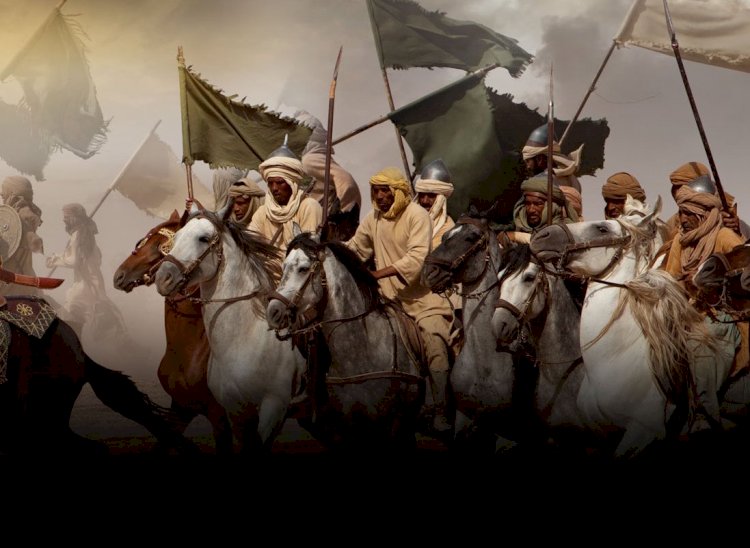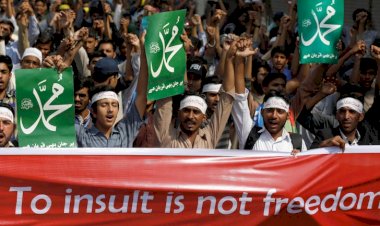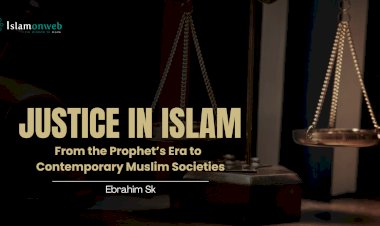Jihad: The Politics of ‘Just War’ in Islam
"Is Islam a religion of inherent conquest ideology?" An unevidenced answer of 'Yes’ resonated worldwide and founded one of the central pillars of Islamophobia. The terrorist actions of so-called Muslims also contributed in creating this well-designed myth of war-mongering Islam. Although Muslims defend themselves by rendering Islam synonymous with peace, the Islamophobic discourses sound louder.
Islam a war-mongering religion as portrayed by Muslim extremist outfits like ISIS and Al-Qaeda, or is it a pretext for their terrorist activities? This article tries to answer this question.
Jihad has been discussed in mainstream media, especially after the 9/11 attack. Terror is now synonymous with Jihad, and the terrorists are named Jihadists. The Arabic word Jihad actually means ‘to strive’, to ‘exert strength’ and ‘effort’. It could not be translated as holy war, a concept which does not have any base in Islam, as war could not be equated with the concept of holiness. Though, apart from ‘fighting’, the term ‘Jihad’ does imply all striving in the path of Allah Almighty. Quran states: Strive hard in God's path with all the striving that is due to Him (Q 22:78). Prophet Muhammed's words could be read in the same context: "Al mujahidu man jahada nafsahu" The fighter in God's path is one who strives against his soul.[i]
Muslim scholars classified Jihad into two types; the lesser Jihad, which is armed combat and the greater Jihad, which is a person's Jihad against his desires. It is reported that Ibrahim bin Abi Alqama used to ask warriors returning from the battlefield: "You have come from the lesser Jihad. What about your greater Jihad?" When they asked him about the greater Jihad, he replied: "It is the Jihad of heart".[ii] The famous Muslim theologian Ibn Taymiyya considers this spiritual Jihad a prerequisite for material Jihad. "Jihad against the self is the foundation of Jihad against the unbelievers, and a Muslim cannot wage war against them unless he wages war against himself and his desires first".[iii]
It is evident that Jihad, in the meaning of Qitāl (armed combat), has great importance in Islam, but it is not identical to what is now presented by Islamophobes. The first verse revealed permitting to fight, along with an early revealed verse in the Madinah phase, sets up the principles of armed combat in Islam.
- "Permission is given to those who are being fought because they have been wronged". (Q 22: 39)
- "Fight in the way of Allah those who fight against you, but do not transgress; Allah does not love transgressors". (Q 2:190)
These two verses reinforce the Jus ad Bellum (the conditions under which States may resort to war or to the use of armed force in general) of Jihad. It is 'non-aggression except being wronged first' as Ibn Taymiyyah says, "The default rule is that the blood of the human being is prohibited except by right of justice".[iv] A war cannot be justified unless the adversary initiates hostilities, obstruct the Da'wah, or harm those who call to Islam. Thus, the right to war was established only with the aim of protecting the freedom and security of the Muslim community and not as an ideology of occupation. It is also important to note that the right to declare an armed Jihad is entrusted only to the head of the state and not to all people. He should ensure its necessity and act upon the rules, not on his whims.
In classical Jurisprudence texts, there is a Shari'a dictum that presents Jihad as a necessity of means, not of end (Jihad: Wujubuhu wujubu al-Wasa’il la al-maqasid).[v] This dictum treats war as a last resort which is limited to a response to defend greater harm. This embodiment of just war could be seen in the words of Prophet Muhammed, "Never wish to meet your enemy, but ask Allah for safety".[vi] These well-established terms and rules of Jihad outlaw the aggressive terrorist tactics used by current extremists.
The Jus in Bello of Jihad is discussed in the classical Islamic doctrine of war codes and conducts, which forbid the wilful killing of non-combatant civilians consisting of women, children, elderly, ill men, and blinds. The Prophet says: "Do not kill elderly men, infants, young children, nor women."[vii]
Another relevant discussion is about a vital aspect of Jihad: "What is its Casus Belli?" "What could be the reasons to wage war?" "Are Muslims obliged to wage war against all disbelievers because they disbelieved in God, or are there any other conditions?" The answer to this question could be seen in the words of prominent medieval jurist Ibn al-Qayyim. He opined that: "fighting is only a duty in response to being fought against, not in response to disbelief. This is why women, children, the elderly and infirm, the blind, and monks who stay out of the fighting are not fought. Instead, we only fight those who wage war against us."[viii] This notion manifests in the life of the Prophet as he never forced religion upon anyone. The Quran clearly states, "There is no compulsion in religion, True guidance has become distinct from error" (Q 2:256)
Here, it raises doubt about the offensive war politics of Islam. Some classical Jurisprudence texts maintained the view of offensive war, which was considered a communal duty once every year. The contextual reading reflects the background of issuing such fatwas. It has to be read and interpreted in the context of the views and fatwas.
When we look back to the history of Islamic jurisprudence, we can see some scholars who reflected on the ground reality of then-world politics. At that time, there was no effective international entity to enforce the territorial sovereignty of all nations. As realist political theorist Thomas Hobbes advocated, "without any legal authority to enforce peace, all people are in that condition called war. And such a war is of every man against every man."[ix] Those fatwas were issued considering the context of this state of war (Dar Al-Harb) in which the security and freedom of the Muslim community were threatened. At the international level, this situation was brought to an end only after the signing of the UN Charter in 1945 (at least in theory, as it was & is constantly breached by dominant powers), which made explicit statements regarding territorial sovereignty and set rules and regulations to maintain the peace and security of all nations:
“All members shall settle their international disputes by peaceful means in such a manner that international peace, security, and justice are not endangered."
Article 51 of the charter also authorized the right to defend themselves from attack:
"Nothing in the present charter shall impair the inherent right of individual or collective self-defence if an armed attack occurs against a member country."
Nevertheless, in Islam, all these rules and regulations of war and peace were already enshrined, even thousands of years before the enactment of the UN charter. In Islam, the offensive strategies could be only implemented after ensuring the impossibility of the peace treaty and only as a last resort. Furthermore, if a war is fought with necessity, it must conform to all codes and conducts. Hence, a comprehensive, just war theory put forth by Islam could not be equated with terrorist acts.
In this context, we can read the most misinterpreted verse in Quran:
"Slay the idolaters wherever you find them and besiege them, and lie in ambush for them everywhere". (Q 9:5)
The next verse itself offers asylum and safety to the enemy if they enter into the peace treaty, whether they accept Islam or not:
"If any of the idolaters ask for your protection, grant them protection until they hear the word of Allah, then deliver them to their place of safety. That is because they are people who do not know." (Q 9:6)
Thus, Allah's order for the offensive method is to cease their first aggression as he clearly says:
"But if they incline towards peace, incline to it too" (Q 8:61). Ignoring this context, one may portray Islam as a violent, belligerent and war-mongering religion.
Moreover, the history itself testifies to the ‘just war’ theory of Islam. The statistic study entitled "Body count" by Dr Naveed Sheikh compares the fatalities caused by major civilizations and religions from CE 0 to 2008.[x] The world fatalities caused by the Christian world are six times higher than Muslims; the anti-theist communist regime has a share which is four times higher, while the Buddhists, portrayed as the symbol of peace, contribute a number that is three times higher. However, the paradox is that Muslims can easily be depicted in mainstream media as inherent terrorists. It is mostly because of the superficial reading of the Quran without contextual understanding. In addition, the vested interests and funded agendas also feed this deliberate misinterpretation.
In conclusion, Jihad is not a concept of war devised to expand the kingdom by unjustly conquering new territories. The ‘just war’ theory of Islam restricts its use to secure the Muslim community's life and property and preserve their right to profess and preach their religion. After clearly understanding the concept of Jihad in Islam, one could not make it parallel to terrorism and call it a war-mongering religion.
Endnotes:
[i] Tirmudi no.1671
[ii] Ibn Rajab, Jāmiʿ al-‘ulūm wa-al-ḥikam (Beirut: Muʾassasat al-Risālah, 2001), 1:489.
[iii] Ibn Qayyim al-Jawzīyah, Rawḍat al-muḥibbīn wa nuzhat al-mushtāqīn (Beirut: Dār al-Kutub al-’Ilmīyah, 1983), 1:478.
[iv] Taqī al-Dīn ibn Taymīyah, al-Ṣārim al-maslūl ’alá shātim al-Rasūl (KSA: al-Ḥaras al-Waṭanī al-Saʻūdī, 1983),
1:104.
[v] Ibn Hajr al-Haytami citing al-Zarkashi, Tuhfat al-Muhtaj bi Sharh al-Minhaj (Beirut: Dar Sadir, 1972), 9:211.
[vi] Bukhari no.3024
[vii] Abu Dawud no.2614
[viii] Ibn Qayyim al-Jawzīyah, Ahkam Ahl al-Dhimmah (Dammam: Ramadi li’l-Nashr, 1997), 1:110.
[ix]Thomas Hobbes, Leviathan 1668 (Indianapolis: Hackett Pub. Co, 1994), 76.
[x] Naveed Sheikh, Body Count: A Comparative Quantitative Study of Mass Killings in History (Jordan: The royal aal al-bayt institute for Islamic thought, 2009).
About author:
Mohammed Ashmil Shah is a Post-Graduate Research student at the Department of Societal Development, Darul Huda Islamic University, India.
Disclaimer
The views expressed in this article are the author’s own and do not necessarily mirror Islamonweb’s editorial stance.

























Leave A Comment